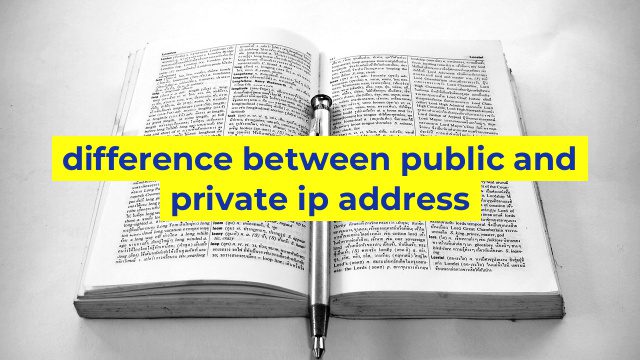Difference Between Public and Private IP Address: Everything You Need to Know
If you’re not familiar with the technical jargon surrounding networking and the internet, terms like IP address may sound alien and confusing. However, understanding these terms is essential for anyone who interacts with online systems, which is virtually everyone in this day and age. In this article, we’ll specifically look at the difference between public and private IP addresses so that you can gain a better understanding of them.
What is an IP Address?
The IP address, which stands for Internet Protocol Address, is a unique numerical label assigned to devices that connect to the internet. It acts as that device’s unique identifier on the internet, much like a postal address is used to identify a physical location.
There are two types of IP addresses: IPv4 and IPv6. IPv4 uses a 32-bit address format and can only support approximately 4.3 billion addresses, while the more recent IPv6 uses a 128-bit address format, enabling it to support almost an unlimited number of devices.
What is a Private IP Address?
A private IP address is an address within a closed network, such as a Local Area Network (LAN). Private IP addresses are typically assigned by a router to devices within the network. These addresses are only unique within the network, and their purpose is to allow devices within a network to communicate with each other.
Private IP addresses are not accessible from outside the network. Routers use Network Address Translation (NAT) to translate between public IP address and private IP addresses, allowing devices within the network to communicate with devices outside of it.
What is a Public IP Address?
On the other hand, a public IP address is assigned by an Internet Service Provider (ISP) to a device that needs to connect to the internet. This is the address that is visible to other devices on the internet. A public IP address can be used for communication between any device on the internet, making it a global address.
When a device on the internet sends a request to another device, it uses the public IP address of the device as the destination address. Once the request reaches the device’s router, the router uses its NAT function to translate the public IP address to a private IP address, which is used to route the request to the device.
The Difference Between Public and Private IP Addresses
In summary, the main difference between private and public IP addresses is their function. Private IP addresses are used within closed networks, allowing devices to communicate with each other, while public IP addresses are used for communication between devices on the internet.
Another difference between these two types of IP addresses is their uniqueness. Private IP addresses are only unique within a particular network, while public IP addresses are unique across the entire internet.
In Conclusion
Understanding the difference between public and private IP addresses is essential for anyone who interacts with networks and the internet. Knowing the functions of these types of IP addresses enables you to troubleshoot network problems and configure network devices for optimal performance. With this knowledge, you’ll be better equipped to manage your network and ensure that your devices can communicate with each other and the internet seamlessly.
Table difference between public and private ip address
| Feature | Public IP Address | Private IP Address |
|---|---|---|
| Definition | An IP address that can be accessed from the internet. It is assigned by the internet service provider (ISP). | An IP address that can only be accessed within a private network. It is assigned by a local network administrator. |
| Accessibility | Can be accessed from any device connected to the internet. | Can only be accessed from devices within the same local network. |
| Uniqueness | Public IP addresses are unique and assigned to each device connected to the internet. | Private IP addresses can be duplicated within different local networks. |
| Availability | Limited availability due to the depletion of IPv4 addresses. | Abundantly available as they are used only within the local network. |
| Security | Less secure as they are accessible from the internet and can be targeted by hackers. | More secure as they are only accessible within the local network and are not directly exposed to the internet. |


